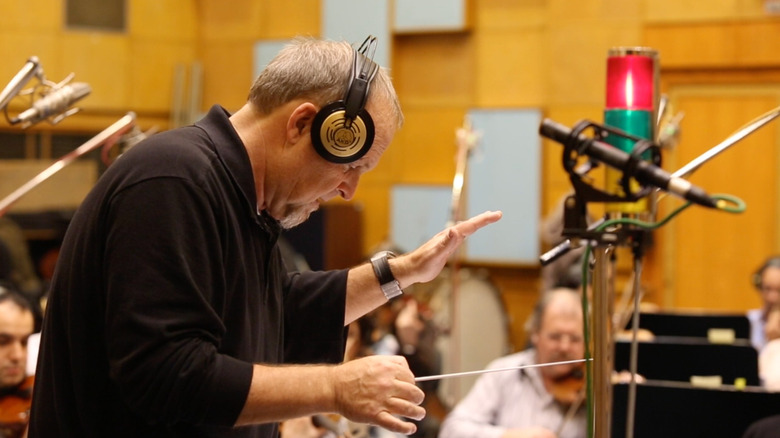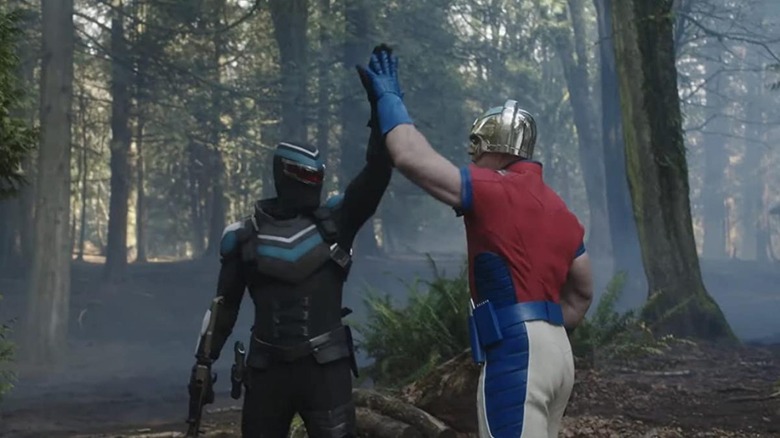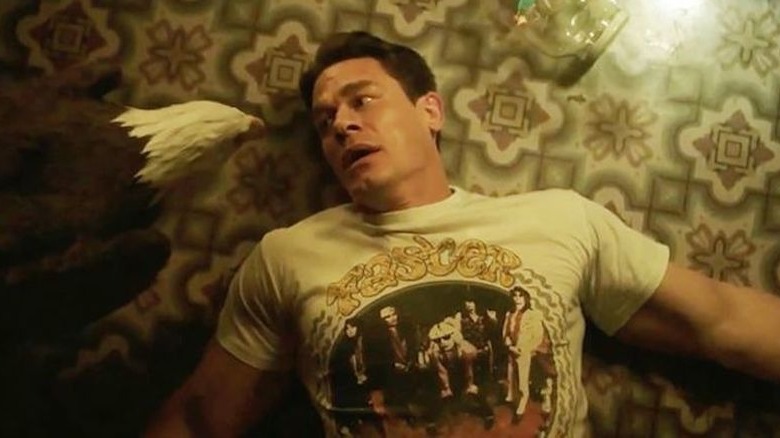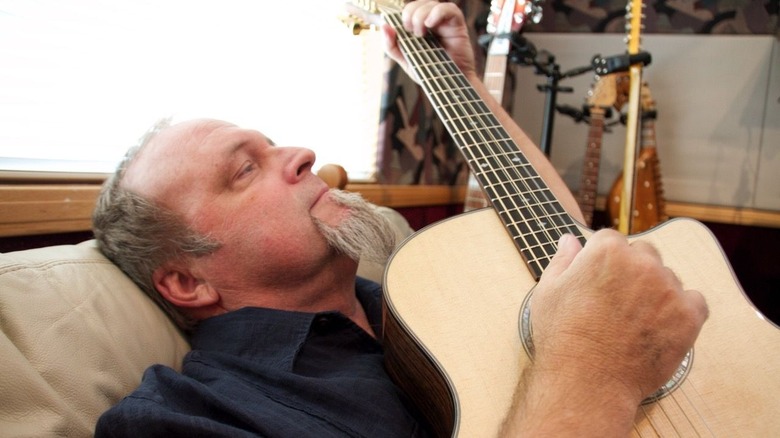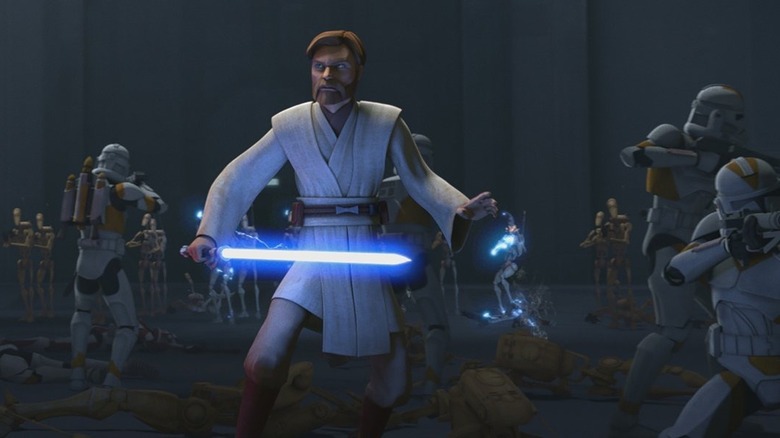Peacemaker Composer Kevin Kiner On Hair Metal, Rock 'N' Roll Scores, And George Lucas [Interview]
Kevin Kiner brings rock to "Peacemaker." Filmmaker James Gunn and his music supervisors, Ian Broucek and Evyen Klean, do that job as well with their entertaining needledrops, but it's composers Kevin Kiner and Clint Mansell who bring a little rock 'n' roll to the score. For "The Suicide Squad" spin-off series, the duo wanted to combine rock with a staple of comic book adaptations — an orchestra. In recent years, for Kiner, that's become a more traditional approach to scoring.
"Film scores in general are kind of going in that direction, where the orchestra is an element, but there's also a modern element, like either electronic or rock," Kiner told us in an interview for "Peacemaker."
The Emmy-nominated composer best known for scoring all seven seasons of "Star Wars: The Clone Wars," Kiner is a versatile musician, scoring shows such as "Jane the Virgin," "Narcos: Mexico," "Doom Patrol," and recently, "Star Wars: The Bad Batch." Those credits barely begin to cover Kiner's vast body of work, though. In a recent interview about "Peacemaker," Kiner talked to us about his approach to the HBO Max show, his newfound appreciation of hair metal, and collaborating with George Lucas.
"I was jus a kid in a candy store."
You have a rock 'n' roll background, so did this show feel right up your alley?
Yeah. When James told us about the late '80s, early '90s hair metal thing, we decided to try to incorporate that along with the orchestra, do a hybrid. I was just a kid in a candy store. There are thousands of young guys at Guitar Center that go in, pick up a guitar, and start shredding, but not many of us get to do it for a living. Not many of us who aren't in Van Halen or Cinderella. Very few people get to do it, and I have it in my career. I did a show a long time ago called "Dead at 21," for MTV, where I got to play a lot of that kind of stuff. That was like 25 years ago, I think.
John Murphy told me something similar for "The Suicide Squad," that he wanted to combine guitar with a traditional orchestra. Have you done that a lot?
I've been doing more and more of that, even with "Bad Batch." Not so much with metal rock, but with electronic elements. Film scores in general are kind of going in that direction, where the orchestra is an element, but there's also a modern element, like either electronic or rock. You see Brian Tyler does it when he plays drums. John Murphy, who's one of the great guys out there, Harry Gregson-Williams, and of course, Hans Zimmer. Scores are becoming more hybrid these days. I think it's good. If I'm doing it in "Star Wars," then there's room for it anywhere, because I think "Star Wars" for a while had to be precious in the John Williams style.
But then, I started stretching out in "Clone Wars" and "Rebels," and then what Ludwig [Göransson] did with "The Mandalorian." It was time for it to grow. My brother called me, and I was doing some crazy guitar part, and I had my Marshall Stack out. I haven't really used that [guitar] properly in quite a number of years. Just to do that, I told him it was Christmas. It really was, 'cause I've got all these guitars that I get to play. It's really a lot of fun.
I've heard you say that with your background in rock, it gives you a different advantage as a composer. What is the advantage?
Well, it's in the same way John Williams has a great advantage in his background in classical music. You can hear it in the way he thinks and the way he writes. My background is Led Zeppelin, Yes, and Black Sabbath. I wore out Paranoid when I was a kid. I literally wore out the grooves on that record. That's just the way I think. Even when we're doing strings, and they're doing short notes — dun, dun, dun, dunta — that's very similar to a guitar. I don't know if it's an advantage, but it comes naturally.
Did the "Peacemaker Rock Theme" come naturally then?
That was when we were writing the theme, and we just went crazy. Crazy operatic vocals towards the end. It's nice that a show has freedom to be ridiculous, but in a fun, cool way. That's kind of the ultimate ridiculousness.
That music with him and Eagly, it makes for quite an image.
It's funny, we went a little more over the top in our first pass for Eagly. When Eagly gives him a hug, James kind of pulls us back, like, "It's kind of already there guys." We were almost like "Battle Hymn of the Republic" or something. Yeah, that was fun. James is good at finding the moments where it's okay to be ridiculous. Then, when it's already on the screen, we just need to give it a texture of the patriotic vibe and the warm orchestra sound.
You and Clint don't play up the comedy too much in the score.
That's right. Yeah, that's completely correct. Doesn't need any help that way. Thank goodness.
"James is really big on the emotional journey that Chris is going through."
How did you and Clint collaborate?
Well, we started actually on a film, God, 10 or more years ago. Then, in earnest, we really started on "Titans." I met him at an awards dinner. I've been a fan of his way of thinking. He's so outside the box. "Requiem for a Dream," "Moon," and even "The Wrestler." He's just really cool. We started working together on "Titans," and his vision for that was super electronic. Let's not be quite an orchestra superhero. Let's be as electronic as we can in a lot of the places. Then, he even took it further in "Doom Patrol," where that's just really, really crazy electronics. Then, we brought some of that electronic element to "Peacemaker" as well. It's not just hair metal, drums, and thrash guitars. There's a lot of that quirky, unusual synthesizer in the "Peacemaker" score.
How'd you two want the score to play off of James Gunn's song choices?
It's the star musically of the show the same as it was with "Guardians of the Galaxy." The star of the show is the soundtrack. James is a master at picking that stuff. It's funny listening to him and Clint geek out. I'd never heard of the band Hanoi Rocks, but both Clint and James really, really know that stuff deeply, and they were just talking about the origins and their influences. I was Googling Hanoi Rocks. I'd never heard of them.
Since these moments don't rely much on rock, how'd you approach the scenes between Peacemaker and his father?
James is really big on the emotional journey that Chris is going through, the screwed up life he's had, the problems with his father, and the way his father raised him and who he is and who his father is. I think it was in episode 1 or 2, there's a scene at the refrigerator where Auggie is saying to Chris, "I never loved you." We do a guitar-based emotional cue there, became it's Peacemaker's emotional theme. It was important to kick off what the emotional component of the score was going to be.
What guitar were you using for that?
I know that my first pass I used the Fender Stratocaster, but I believe by the time I finished it I used a Gretsch White Falcon or something like that. I actually don't remember what guitar I used, but it was an electric guitar.
For those two guitars you mentioned, in your mind, what different effects do they create?
A Fender Stratocaster is a cleaner guitar. Clapton was famous to have played it most of his career and continues to. The Gretsch White Falcon, now it's getting hip, but for quite a while it was the not so cool guitar. You wanted to have either a Fender or a Gibson, while Gretsh was considered a little bit hokey. Guys like Chad Atkins would play it because it was a hollow body. It has a little more of an acoustic type of sound to it because it's a hollow body. Also, the pickups are arguably not as smooth and buttery as a Fender or a Gibson, they're a little trashier, in a good way now. In a way it sounds a little less polished, a little more what an indie band would use or something like that.
"Really, it's an evolution of rocking out, man."
For the butterflies, how sci-fi did you want the score to go?
It's all on a case by case basis. As the score goes along, it was really not a sci-fi sound that the butterfly has, it was more horror. What James kept mentioning was there are some horrific things that our team gets involved with, and they really don't know what's going on with the butterflies either. With the strings or brass or whoever plays random notes, sometimes that can be pretty squeaky high. I think that is more coming from the horror genre than it is from the sci-fi genre.
When you get to the end, how big did you want the orchestra to go? Without spoiling anything, how'd you approach the finale?
They gave us a full orchestra and it did get very big. It's just natural the way the scenes played out that it became much more of a film score and the orchestra had a more prominent place than say it did in episode 2. Having said that, we still have our foundation in the "Peacemaker" theme, and that theme plays well with the French horns and the violins and the trombones and all the brass and things like that.
There are moments when members of our team have to really step up their game and we use the "Peacemaker" theme and just maybe bits of it throughout the score and that. Also, we still have the heavy hair metal groove going on sometimes. Not all the way through every cue, but it'll come in. There's a cue in the finale where it starts very orchestral, starts kind of heroic. And then all of a sudden, these slamming arena drums come in with a bunch of metal guitar and then the French horn takes on the melody. So in terms of the frequency spectrum, we're pretty much using everything there is.
Since you weren't too familiar with hair metal, did you do a lot of research?
Yes. I mean, Clint really, really has an encyclopedic knowledge very similar to James Gunn. With the band Hanoi Rocks, they were saying, "Oh yeah, they were an influence on everything that came after it." These emails that were going back and forth between Clint and James, I was cracking up, because I don't know anything about that band.
Say, if it's John Williams, who I've had to try to sound like him in all of the "Star Wars" stuff over the years, sometimes it's better studying the guys he's studied than it is studying him. You don't want to be a mini me of whatever that is. In the same way that the hair metal guys were obviously influenced by Zeppelin and Sabbath, which were my influences. It's just natural to take that a step further. Once you start using the amps and the guitars and stuff that the hair metal guys use, and then you hear some of the licks they use, sure, you can borrow from that. Really, it's an evolution of rocking out, man.
So did this job give you an appreciation for hair metal?
It did. Yes. Absolutely. For instance, Hanoi Rocks. I'm friends with Fred Coury, who's the drummer for Cinderella. He actually played drums on episode 2. Fred and I go to this composer dinner once a month, and we just became friends. I really didn't know why he was at the composer dinner and it turns out he's composing now for Dean Devlin and other people. Now, I'm listening to Cinderella because I knew nothing about Cinderella and then it became a big deal on "Peacemaker," and I'm like, "Yeah, I think I know one of those guys." And then Fred, he was really happy. Hopefully, in season 2 we'll get to use him even more, because his drum sound is just freaking monstrous. I mean, it's unbelievable.
What are those composer dinners like?
Yeah, this one dinner that we have there's like Danny Lux, who does "Grey's Anatomy," Don Davis who did "The Matrix," and Bruce Miller who wrote the "Frasier" theme. I mean, runs the gamut, all these cats. Sometimes we'll geek out and talk about gear. I remember I was down the table and I was trying to remember what "The Rite of Spring" cord was. There's a thing that Stravinsky did in "The Rite of Spring" that's pretty famous and somebody yells down the table, "Hey Bruce, what's 'The Rite of Spring' cord?" Bruce Miller puts his hands down on the table, like he's playing it on piano. He goes, there it is, it's this. So, it's a little esoterically geeked out, I think, sometimes. Other times we just talk about life and politics and, well, not politics anymore. It's really refreshing, because we're locked up in our studios all day, man. It's a solitary life that we live as composers, so we tend to be pretty chatty.
"Sometimes too new is not good."
How's talking to George Lucas about music? How's his ear for music?
George is definitely a broad strokes guy that really likes to throw stuff up against the wall and see what sticks more than anybody I've ever worked with. I read one of the making-of "Star Wars" books, and there was a version of the script where about a third of it was in Japanese with subtitles. This is for "A New Hope," and George would take the scripts with his friend like De Palma and Spielberg and I guess, I don't know, Scorsese.
Coppola, too, right?
Coppola, yeah, that's it. They would go up to this cabin and they would read through his latest version and he would change the script radically from month to month. They would all give him criticisms. You just see in that he hates doing something that's been done before. He doesn't want to do anything that he'd done before.
You could see that when he made the prequels, he tried to stretch things. He did that with me musically a ton of times. He would throw me a CD like, "Here, my son's listening to this, let's put this in this Obi-Wan space battle early on in season 1 in 'Clone Wars.'" The CD is all hip-hop music, and I'm like, "I can't put hip-hop in it." And then everybody, they're telling me, "No, don't do this." They're not saying that to George's face but everybody, the producers, everybody's like no.
I had to figure out what he was all about. I saw that he wanted to experiment. I actually did one version of that cue that was pretty straight ahead hip-hop and didn't work at all. And then another version that had some of the electronic elements and some of the beats, but also had the orchestra in there and even had a little bit of the John Williams sound. But more of a hybrid kind of thing than the John Williams sound.
So I brought both of those different versions of that scene. I gave it to the editor. I brought it up to Skywalker Ranch when I met with George and 12, 14 people in the room. Everyone is telling me, "No, we can't do it." Everybody shuts up as soon as George comes into the room. It's on me to have to tell him this, right? I'm the one. And so, we played the hip-hop thing for him and he's bopping his head and he goes to me after it's over, and he goes, "Well, what do you think?" I hadn't thought of these words, but they just came to me. I'm like, "Man, I think it makes 'Star Wars' like 'Power Rangers.'" He is like, "Whoa."
And then I said, "Here, listen to this, I did this other version that's a hybrid." He listened to that and he was like, "Oh, okay. That's cool." So what you get from George is that he does like to experiment, but he knows when to back off. He knew when to not have a third of "Star Wars" be in Japanese with subtitles, even though that was an idea he'd had, but he knew to pull back.
It's the same with the music, he knew when it wasn't working, even though he was trying to think outside the box and be new. Yeah, sometimes you can't. Sometimes too new is not good, but it's cool that he likes to experiment like that. It was cool to be pushed in those different directions, too.
I like that. I also liked how you put going back to the source, not whatever band, or even storyteller, it influenced.
Yeah, yeah. Go to Noël Coward, don't go to the guy who liked Noël Coward. Go back to the source.
"Peacemaker" is now streaming on HBO Max.
